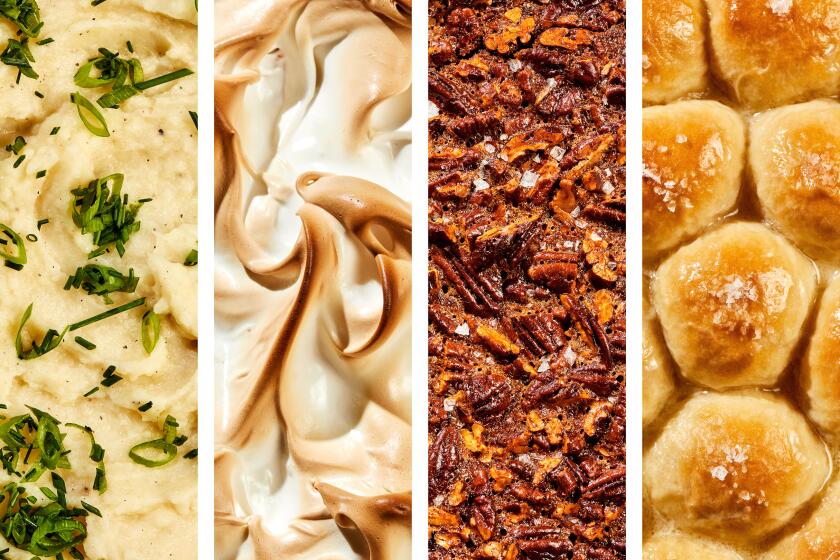FOOD : Simply Good : āOrdinaryā Food Can Be Very Special--in a Caring Cookās Hands
MORE THAN MEN, I think, women share important memories as tokens of their love. One recollection so given me was of a small girl watching her father making macaroni and cheese. His method was a loving ritual of sustenance. The ingredients were prepared and mixed in a large, heat-proof mixing bowl, which was then set directly in the oven and periodically removed during cooking for further incorporation of a precisely gauged amount of additional cheese. By the time the dish was ready, the elbow macaroni sported in it like dolphins in a savory orange-yellow sea.
The strong fatherly arm stirring the bubbling ingredients with a sauce-coated wooden spoon, the fragrant heat wafting out the open oven door, the gold and glistening mound of freshly grated cheese waiting on the counter, the hungry little girl whose fascination and ardent appetite was to the cook a special seasoning--these are powerful images.
But their power is also of a special kind and shows the difference between two very different kinds of culinary experience, that of the eater and that of the cook.
As it happens, Iām very fond of macaroni and cheese and keep a special spot in my heart for cooks who genuinely love it: They are not that many. But Iāve been thinking of it lately as a kind of familiar food that seems especially vulnerable to commercial corruption--like homemade marinara sauce, vegetable soup, baked beans--dishes less out of style than no longer possessing any style at all.
And so we have turned away from them, thinking them too ordinary to interest us. But the truth is that we no longer know how to be interested in them, which is a very different thing. For although these things cannot command interest, like many good things whose character has been dimmed by time and use, they can richly reward us should we choose to give them anyway.
If we donāt see this, it may be because we have become more accustomed to think about food as eaters, rathers than as cooks. Eaters think in terms of taste. Reaching for the jar of Progresso marinara sauce or Campbellās chunky vegetable soup, they regard it simply as something about as good as they could make themselves. And they may well be right: If most homemade chicken broth was as different from the canned version as some like to claim, College Inn would have been out of business long ago. The difference is there, but it is up to the eater to decide to notice it.
For the cook, however, the story is not quite the same. One important dimension of kitchen experience is what I have previously called--for lack of a better term--resonance, a palpable depth to the things out of which we make our meals. In their way, these things speak, and it is our ability to hear, to enter into a kind of conversation with them that marks our crossing over from kitchen worker, however skilled, to true cook.
Making macaroni and cheese, this resonance starts with the familiar heft of the cooking pot as I pull it from under the counter. Cast iron and coated with orange enamel, scoured and stained through years of use, it has been a companion through my entire life as a cook. As I fill it with water, the handle presses against my hand with the firm assurance of a friend.
From the refrigerator, a chunk of Wisconsin Cheddar, richly pale as clotted cream. The grater set over my largest mixing bowl, the cheese slips into shreds, heaps into a generous pile, a whole pound of it--minus the slivers that break away and tumble to the side, appetizers for the cook. The water boils. I take down the noodles, in this instance, a box of rotini, one of the more playful shapes of the pasta tribe and not at all the best choice for this dish, since the thick sauce may refuse to adhere to their spirals. But itās all Iāve got, so in it goes anyway, handful after handful, into the boiling water.
Butter is cut to bits, the can of evaporated milk rooted out from its hiding place and spiced with a fat scarlet drop of Tabasco, two eggs taken from the fridge and beaten to a frothy mass. One of the rotini must be speared and tasted. The pasta must be caught at just the right moment, still with a tiny bit of āspineā or crunch, so it can finish its cooking while absorbing the taste and savor of the sauce.
After a quick shake in the colander, they are tumbled into the mixing bowl, tossed with butter, mixed with everything else, the cheese stirred in bit by bit to keep it from clumping into lumps, some of it--and some of the evaporated milk--held back for later. The bowl is slid onto the oven shelf with a glance at the clock--and the rest you already know.
All of this is absolutely ordinary, and yet there is much here to take pleasure in. The dish is put together without recipe, memory tugged for ingredients, proportions and timings that are obvious and simple and fall together. Each step puts a familiar kitchen tool through its paces; each step asks for small but necessary decisions. And, also, the work is framed in pleasant anticipation, begun when I chose the cheese at the store and not done until I scrape and eat the last bits of baked cheese from the sides of the bowl.
Around all this is a net woven of association. My recipe draws in large part from my motherās, but it is still my own, changed by my own taste and by the lives that have impinged on mine, such as that oven-going mixing bowl. It is also association that has me use evaporated milk, whose sweet-sour tang evokes for me the version made by the Irish lady who kept house for my grandmother and who also added (as I also sometimes do) fresh tomato--peeled, seeded, cut in chunks and drained on paper towels before being mixed in.
At the same time, the very simplicity of the dish means that it welcomes spontaneous gesture--the handful of chopped, cooked ham, the rotini substituting for elbow macaroni (or pasta replaced entirely by a chopped head of cauliflower). In the same way, one time it is seasoned with Tabasco, the next time with nutmeg, and on and on.
I donāt want to pretend that ordinarily all or even part of all this is consciously articulate--just the opposite. Even specific decisions hardly ever flicker into word. As my hands do their work, I listen to music on the radio and think about other things. Even so, I know that it is there around me--a hum not quite audible but still companionable, useful, breaking into my thoughts now and then to remind me of something forgotten, like bidding me to make sure that the sauce does in fact cling to the rotini.
If I had spent about the same amount of time making this meal from a box of Kraft macaroni and cheese dinner, the work would have been less, but the experience would evaporate into nothing. Directions are printed on the package; most of the ingredients are provided. No chain of association leads me from the garish orange ācheeseā powder to cheese itself, let alone the cow. And although I could elect to add some other things, the dish would still unequivocally belong to Kraft (if only because, on my own accord, I would never purchase the individual components--whey, granular Cheddar, powdered buttermilk--to make this dish from scratch). There is nothing here with anything to give to the cook--only to the person who does not want to be a cook.
On the other hand, however, there is also nothing in the making of macaroni and cheese--or vegetable soup or baked beans or tomato sauce--to offer true challenge to the good cook. But mastery of the difficult is only one of the rewards of cooking, and it is worth remembering now and again that there is a humbler gift a dish can give the cook: the pleasure of its company.
Intimate Cuisine
SOMETHING HAS HAPPENED to supper. I donāt mean di , that special, slightly formal meal that we have friends over to and sometimes sit down to ourselves on special occasions, but the plain and casual feed that awaits us at end of day. I still look forward to it, but when I actually pull up to table, thereās been a hesitant feeling somewhere inside me, a sense that something was no longer right.
All this must have been edging around in the back of my mind for some time, but I only became actually conscious of it the other night, watching one of those television ads where the family waits with bated breath for Dadās approval of some or other thing Mom once made from scratch. But my sense of disquiet had nothing to do with the product. I realized I didnāt believe in supper anymore, at least not that kind of supper.
With that realization came a sudden, happy feeling of relief. My relations with that meal have been troubled for a long, long time. Iāve always believed that home cooking means foods simply and inexpensively made from cupboard stables. But Iām also aware that it mostly isnāt--and how tempted almost every cook is to fall back into the waiting arms of the crowd of convenience foods that fill the supermarket shelves.
Not, of course, that some of those arenāt better than others. Still, the fact that many cooks feel that they have no choice except to make meals scraped out of cans or defrosted from the freezer means that we are forced into playing a role we donāt yet fully understand. After all, why should we--any of us--feel compelled to go on making more and more compromises in making a meal that shouldnāt, and never did before, require it? We pay so much; we get so little back.
The usual argument, of course, is that these meals save us labor or time. But good, simple food from scratch can be set on the table almost as easily, so easily, really, as to make no difference. But--and this is the really important point--that food isnāt the same as āsupperā at all. When I cook for myself, I could easily make that kind of meal. But in my relationships, almost always, it hasnāt seemed quite enough. Instead, as best as I or the other could, we compromised or worked harder than was fair or sensible, to put real supper on the table.
The reason for this compulsion, I now realize, came from a sense of civility, of what in a family we sense is due the others. If that due is not paid, even for the best of reasons, it generates a sense of tension, of things not being right. The problem, however--for me, at least--is that this same unease has crept into ordinary supper as well.
What struck home so hard watching that television ad was the realization of how much we all eat supper as though we already were on television. Supper is such an incredibly public meal. Just as we were, many of us, brought up to wear clean underpants in case we got hit by a bus, weāve also been trained to eat supper, to think of supper, as if at any moment the neighbors might shove their easy chairs up outside the picture window and settle down to watch the show.
Now, admittedly, this sense of public scrutiny was the flip side of the familyās sense of self-esteem. It provided part of the cement that held things together. Nothing is wrong with this. Itās just that the strain of providing this kind of theater in our current relationships is starting to tell us something. Itās not so much that we donāt want this at supper, but we hunger for something else very much more. And that hunger springs not from the stomach but from the heart.
Supper, after all, is our most social meal and, of all the dayās contacts, perhaps the most needingly personal one. And it isnāt simply the growing impersonality of the food needed to make our familiar supper possible that distances the eaters at the table from one another but the very shape of the meal itself.
Food, we need to remember, is communication as much as nutrition, and the message isnāt simply what we pay for it, the care we put into making it or even how nicely we serve it forth. Itās right in there with the slices of boiled beef, mashed potatoes, green beans, lump of squash. That plain and homely food is awash with messages for us, talking all the time.
Only itās no longer saying what we need to hear. Its generous servings still speak of prosperity, its quality of good taste, its nutrition of education and concern, its very division into neat portions on the plate of respectability. But these arenāt the things we now need most to say to each other. Outside in the world, things have changed. A public sense of family esteem no longer holds relationships together. Couples and whole families, for that matter, now have to work hard to provide this for themselves.
The way that they work at this is to establish a sense of personal closeness, of a special caring and understanding that only comes from carefully nurtured attentiveness to each otherās private self. What we now want to celebrate at supper is not civility but intimacy, and to do that, we have found an entirely different cluster of manners. Now we need a new way of eating--a new cuisine--to display it.
The intimate eating I have in mind flows from our desire to capture the special closeness such meals provide and bring it into the unromantic eating of the every day.
To accomplish this sense of privacy, intimate food must work in a very different way from the old-fashioned supper. Relaxed, personal, it provides an oasis from our public selves and the pressures of outside demands by pushing the public world away.
First, this is a cuisine of accommodation. Often both partners work and neither wants to put the other to the task of an elaborate nightly meal. Supper must come together simply and easily out of what is at hand and by whoever has the chore or gets home first. And since our days now follow eccentric rhythms, accommodation also means bending to meet the appetite that had no lunch, waiting for a supper time that is suddenly delayed or hurrying when the eaters must rush out directly after.
Next, I think, it is a cuisine of spontaneity. Not that every meal must be impromptu, but there is always the sense that it springs, like good talk, from real attention and not a stock response. Politeness now demands not graciousness but mutual understanding, and supper has become a place where this is most pleasurably displayed. The golden melon on the fruit stand, the impulsive splurge on the first asparagus of the season, the sudden mutual craving for spareribs--intimate eating presupposes on both sides a willingness to meet a mood and join in, something that canāt be done unless little risks are taken, desires voiced, contact made.
Copyright 1985 and 1986 by John Thorne. Used by permission of Viking Penguin Inc.
More to Read
Eat your way across L.A.
Get our weekly Tasting Notes newsletter for reviews, news and more.
You may occasionally receive promotional content from the Los Angeles Times.










